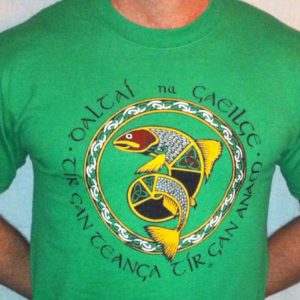It is not upper class or lower class, but up a while and down awhile.
Note: Ancient Irish society had a caste system where birth determined your social class. For example, the son of a Druid, i.e., a member of the intelligensia, was deemed to be a Druid, just as the son of Brahmin in Hindu culture was a Brahmin. Unlike other cast societies, however, Irish individuals could move between classes. The son, or daughter for that matter, of a peasant could become a Druid. This cultural value of social mobility is combined with a sense of luck or fortune in this proverb. It warns the well-off and comforts the not-so-well-off that their good (bad) fortune could be reversed soon.
Note also: There is an interesting play on the words ‘up’ and ‘down’ in this proverb. While the seanfhocal suggests that one’s socio-economic position is constantly changing, it uses adverbs that describe fixed positions. Your position in life may be fixed for now, but it can change later.
‘Thuas’ means ‘up’ in the sense that something is fixed above the position of the speaker, while ‘thíos’ has the same fixed sense but in the opposite direction. For example, if someone is standing at the top of the stairs, and you are at the bottom of the stairs, then you might say,”Tá sé thuas an staighre.” (He is up the stairs.)
In all, Irish has three words for ‘up’ and three words for ‘down’. The “extra” words are used to show movement either towards or away from the speaker. For example, if you are downstairs and someone is going upstairs, then you would say “Tá sí ag dul suas an staighre.” (She is going up the stairs.)
